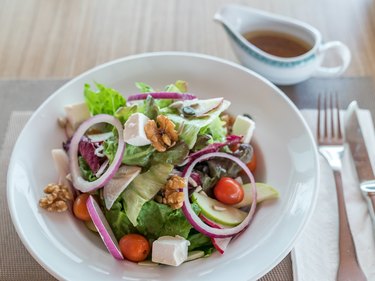
Greek dressing is a common condiment for salads and is often used as a marinade for chicken and other meats as well. According to online recipe database AllRecipes.com, Greek dressing typically consists of olive oil, vinegar and a blend of seasonings such as oregano, pepper, salt and garlic. Depending upon the amount of each ingredient, the exact nutrition facts may vary, so check nutrition labels when possible.
Calories
Video of the Day
According to the nutrition facts from LIVESTRONG's food database MyPlate, one serving, or two tablespoons, of Greek salad dressing contains from 110 to 200 calories. If you adhere to the recommended intake of 2,000 calories daily, one serving of Greek salad dressing comprises an average of 8.5 percent of your daily recommended calorie intake.
Video of the Day
Fat Content
Because of the olive oil, the primary nutrient in Greek dressing is fat. MyPlate notes that each serving of two tablespoons contains from 5 to 20 grams of fat, though just 1 to three grams comes from saturated fat. Unsaturated fat, such as that contained in Greek dressing, is beneficial for your health as it may decrease your cholesterol levels and reduce inflammation.
Carbohydrate Content
In addition to fat, Greek salad dressing contains one to 15 grams of carbohydrates per serving, according to MyPlate. For this reason, Greek salad dressing may be appropriate for low carbohydrate diets. Nutrition expert Glen Danbury notes that low carbohydrate diets do have some advantages, such as increasing fat burning and regulating insulin levels.
Protein Content
Greek salad dressing does not provide any protein per serving. Because protein is an essential nutrient, you should find other dietary sources that do provide protein. You can accomplish this by adding meat to the salad on which you are serving Greek dressing.
Considerations
If you want a lower calorie salad dressing, look for dressings labeled "low-calorie," "light," or "diet." In addition, you may want to make Greek dressing yourself and reduce the amount of olive oil used. Yogurt-based salad dressings may be lower in calories than regular Greek dressing, but you should check labels to be sure.
More About MyPlate
The free LIVESTRONG MyPlate calorie tracker app for iPhone and Android has helped millions of people lose weight the healthy way — by getting support from an active community as they track their eating and exercise. Consistently a top-rated app, MyPlate offers the latest technology in an easy-to-use tool that includes millions of foods and recipes, 5-minute in-app workouts and a robust support community.